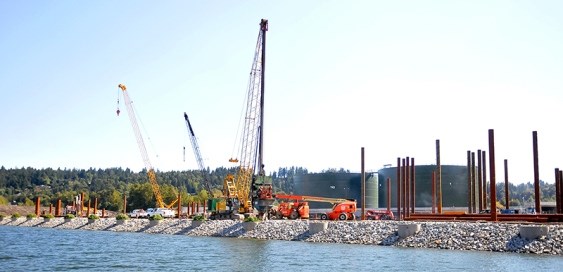The Burke Mountain Naturalists are calling on Pacific Coast Terminals to reconsider its plans to dump dredged materials into the Burrard Inlet.
In a letter to the city of Port Moody and the company, Elaine Golds, a spokesperson for BMN, said studies have shown that the floor of the channel where PCT intends to dredge has higher than normal levels of lead, mercury and cadmium. Disturbing these chemicals and then depositing the materials in the inlet could damage habitat and imperil the food chain, she said.
“My concern is that dredging will work some of [the contaminants] up,” Golds told The Tri-City News on Wednesday. “It wouldn’t be wise to then put them in the shallow parts of the inlet.”
Ideally, she would like to see all of the dredged materials brought onto land, where they could be contained. But she acknowledged that the expense of such a proposal likely means that it would not be possible to carry out.
As an alternative, Golds (who is also a Tri-City News’ columnist, see page 26) said the company should dump the dredged materials beyond the shores of Point Grey at a site that was developed to take contaminated materials.
“The stuff will go down and it will sit there,” she said. “It will quickly become lost to the food chain.”
But Wade Leslie, PCT’s vice-president and general manager, countered BMN claims that the floor of the channel the company intends to dredge is contaminated. He said that the chemicals mentioned in the group’s letter occur naturally and that the company is simply moving ground from one area of the inlet to another.
“There are background levels of cadmium everywhere,” he said. “What we are moving is no different.”
Leslie confirmed that 530,000 cu. m of material will be taken from the channel and moved to an area that is roughly underneath the log booms off the shore of Rocky Point Park.
The site where the ground will be dumped was previously over-dredged, he added, and the addition of the new material will almost level out the seabed below.
Leslie said that the company is currently responding to Burke Mountain Naturalists and he hopes to continue consultation with the environmental group.
“We hold ourselves to a pretty high standard,” he said. “We follow all of the processes that are required and expected of us.”
The dredging work is part of PCT’s plans to expand its operations in order to ship potash and other materials through the port. Over the summer, work began on several large sheds near the company’s sulphur piles and there are plans to enlarge the rail capacity to the facility.
PCT is even planning on building Reed Island, a rocky artificial reef and intertidal zone that will be located on the western portion of the Port Moody arm of Burrard Inlet.
Plans for the island were criticized over the summer by Rod MacVicar, a member of the Burrard Inlet Marine Enhancement Society, which runs Mossom Creek Hatchery. He told The Tri-City News in August that the damage to the habitat on the seabed from dumped rocks would offset any environmental mitigation that comes from the artificial intertidal area.
Once again, PCT was at odds with the eco group, pointing to biologists that said the island would improve habitat in the area. The plans have already received the necessary approvals from Port Metro Vancouver and PCT will be moving forward with the construction of the intertidal area, according to Leslie.
gmckenna@tricitynews.com
@gmckennaTC



